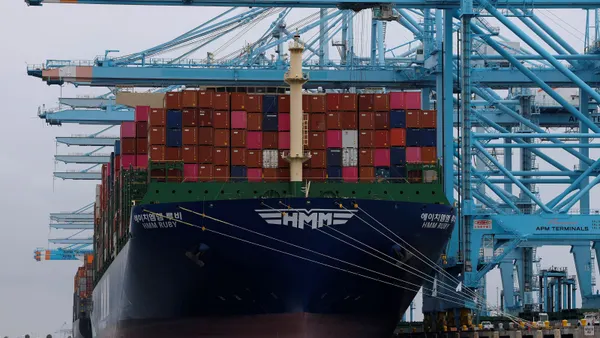The Office of the U.S. Trade Representative on Thursday introduced a fee structure targeting ships built in China or owned and operated by entities tied to the country.
The fees, scheduled to take effect Oct. 14, vary from $18 per net ton to $120 per container, rising every subsequent April. The USTR made some exceptions, including for ships transporting U.S. government cargo.
The fee policy follows a year-long Section 301 probe into China's role in the logistics, maritime and shipbuilding sectors. The fee structure is a significant revision of an earlier proposal that drew nearly 600 public comments and feedback.
The USTR says the fees will bolster domestic shipbuilding, with vessel owners able to attain an up-to-three-year exemption by ordering a U.S.-built ship. While some stakeholders support the policy, others caution the new fees will raise shipping costs and consumer prices without strengthening the U.S. maritime industry.
Below are excerpts from several trade associations on the expected impact of the USTR’s new policy.
World Shipping Council President and CEO Joe Kramek
“Revitalizing America’s maritime sector is an important and widely shared goal — one that requires a long-term, legislative and industrial strategy. We welcomed the vision outlined in the President’s Executive Order, which proposes targeted initiatives to strengthen U.S. shipbuilding, ports, and supply chain resilience. Unfortunately, the fee regime announced by USTR is a step in the wrong direction as it will raise prices for consumers, weaken U.S. trade and do little to revitalize the U.S. maritime industry.
“The World Shipping Council remains fully committed to supporting U.S. efforts to revitalize the American maritime industry. We urge policymakers to pursue strategies that encourage growth, strengthen supply chain resilience, and avoid actions that risk harming American exporters, producers, and consumers at a time when global trade is already under pressure.”
American Association of Port Authorities President and CEO Cary S. Davis
“America’s ports appreciate the Trump Administration’s willingness to incorporate industry’s concerns in their efforts to counter China’s dominance in the maritime space. This policy will, however, still drive up the cost of shipping, reduce volume through our nation’s trade gateways, and make goods, especially automobiles, more expensive [for] everyday American consumers.”
National Retail Federation VP of Supply Chain and Customs Policy Jonathan Gold
"NRF supports the administration’s goal to revitalize the U.S. shipbuilding industry. While we appreciate USTR’s changes to the final actions in the Section 301 investigation on Chinese-built ships, there are still concerns that the proposed fees will be passed along to cargo owners.
“We continue to urge the administration to look for alternative ways to revive the industry without penalizing American importers and exporters. It’s important for the administration to fully evaluate what is required to modernize the shipbuilding industry, including an analysis of workforce needs and a realistic timeline to build vessels. This should be the focus of the recently signed maritime executive order. Additionally, potential tariffs on cranes and other cargo handling equipment will only negate efforts to achieve this overall goal."
Alliance for American Manufacturing President Scott Paul
“The largest obstacles to shipbuilding in the United States are the unfair trade and economic practices of China. While no nation should be faulted for seeking to develop maritime capabilities, Beijing’s ambitions go well beyond that. Our nation’s shipbuilders and workers deserve a level playing field and haven’t had one for decades. We thank the United Steelworkers and their labor partners for initiating this groundbreaking case.
“These measures, coupled with strategic investments in our maritime supply chains and workforce, open new opportunities to revitalize a critically important sector. We look forward to working with the administration and bipartisan supporters in Congress to make sure that this effort is a success.”












